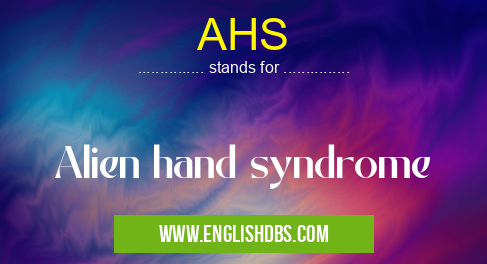What does AHS mean in PEDIATRIC
Alien Hand Syndrome (AHS) is a rare neurological condition characterized by involuntary movements of one or both hands that seem to have a mind of their own. These movements can be purposeful and often involve grasping, reaching, or manipulating objects without the conscious control of the affected individual.

AHS meaning in Pediatric in Medical
AHS mostly used in an acronym Pediatric in Category Medical that means Alien hand syndrome
Shorthand: AHS,
Full Form: Alien hand syndrome
For more information of "Alien hand syndrome", see the section below.
Symptoms of AHS
- Involuntary hand movements: The most common symptom of AHS is involuntary movements of one or both hands. These movements can range from simple gestures to complex actions, such as reaching for objects, grasping them, or manipulating them.
- Lack of control: Individuals with AHS often feel like their affected hand is acting on its own, without their conscious input or desire.
- Alien limb: Many people with AHS describe their affected hand as feeling foreign or like it belongs to someone else.
Causes of AHS
The exact cause of AHS is unknown, but it is believed to be caused by damage to the corpus callosum, a bundle of nerve fibers that connects the two hemispheres of the brain. This damage can disrupt the communication between the two hemispheres, leading to the involuntary movements of the affected hand.
Diagnosis of AHS
AHS is diagnosed based on a physical examination and a review of the patient's history. The doctor will observe the involuntary movements of the affected hand and ask the patient about their symptoms. The doctor may also order imaging tests, such as an MRI scan, to look for any structural abnormalities in the brain.
Treatment of AHS
There is no cure for AHS, but there are treatments that can help to manage the symptoms. These treatments may include:
- Medication: Medications that can help to reduce involuntary movements include botulinum toxin injections, benzodiazepines, and antipsychotics.
- Physical therapy: Physical therapy can help to improve the range of motion and coordination of the affected hand.
- Occupational therapy: Occupational therapy can help people with AHS to learn how to use their affected hand in everyday activities.
Essential Questions and Answers on Alien hand syndrome in "MEDICAL»PEDIATRIC"
What is Alien Hand Syndrome (AHS)?
AHS is a rare neurological disorder where one or both hands behave involuntarily and independently of the person's conscious control. It's often accompanied by feelings that the hand is not one's own.
What causes Alien Hand Syndrome?
AHS can result from damage to certain areas of the brain, such as the corpus callosum, the frontal lobe, or the parietal lobe. It can be caused by stroke, traumatic brain injury, or certain neurodegenerative diseases.
What are the symptoms of Alien Hand Syndrome?
Symptoms include involuntary movements of the affected hand, difficulty controlling the hand, feeling like the hand has a mind of its own, and performing inappropriate or purposeful actions without conscious intent.
How is Alien Hand Syndrome diagnosed?
AHS is diagnosed through a physical exam, neurological tests, and a review of the person's medical history. Imaging tests, such as MRI or CT scans, may be used to identify any underlying brain abnormalities.
What are the treatment options for Alien Hand Syndrome?
There is no specific cure for AHS, but treatments can help manage the symptoms. These may include physical therapy, occupational therapy, medications to reduce involuntary movements, and surgery in severe cases.
What is the prognosis for Alien Hand Syndrome?
The prognosis for AHS varies depending on the severity of the condition and the underlying cause. Some people may experience gradual improvement over time, while others may have persistent symptoms.
Is Alien Hand Syndrome common?
AHS is a rare condition, affecting approximately 1 in 100,000 people. It is more common in adults over the age of 50.
Final Words: AHS is a rare neurological condition that can cause involuntary movements of one or both hands. The exact cause of AHS is unknown, but it is believed to be caused by damage to the corpus callosum. There is no cure for AHS, but there are treatments that can help to manage the symptoms.
AHS also stands for: |
|
| All stands for AHS |
